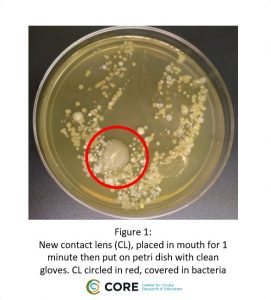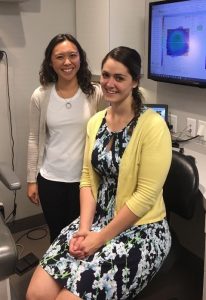High-Potential Ocular Research Applications Extend to Dry Eye & Beyond
WATERLOO, Ontario, February 26, 2019—The Centre for Ocular Research & Education (CORE) has announced an initiative to advance use of the Meso Scale Discovery® (MSD) platform to identify biomarkers in the tear film, expanding ocular health diagnoses and treatment options.
Hundreds of proteins are found in the tear film, and their levels fluctuate for every person. These unique biomarkers offer a new method to indicate ocular issues and other health conditions, representing an untapped opportunity for research and application by pharmaceutical, biotechnology and medical device developers.
CORE’s investment in innovative instrumentation and knowledge specific to tear film protein expression has resulted in a noteworthy offering to the global ophthalmology and optometry fields. This capability was central to a 2018 paper on the effect of denatured lysozyme on the cornea1, and is also being used for ongoing studies regarding contact lens solution formulation.
Central to the organization’s efforts is the MSD® MESO QuickPlex SQ 120 immunoassay imager. Offering a large dynamic range and efficiency unavailable through more traditional ELISA kits, a tear film sample can be multiplexed for up to 10 different biomarkers in a single plate.
Results are then analyzed by CORE BioSciences specialists who have worked with MSD to refine their techniques. With an on-staff phlebotomist, the CORE team can cross-reference outcomes with blood, urine and other tissue samples.
CORE researchers can simultaneously assess for various ocular surface changes (such as the presence of inflammatory cells) using its Heidelberg Retina Tomograph in vivo laser-scanning confocal microscope with the Rostock Corneal Module (HRT-RCM) for anterior segment imaging. In experienced hands, this very powerful technology—with fairly limited global availability—can be instrumental to linking tissue changes with inflammatory biomarkers in the tear film.
“Whether we’re investigating inflammatory cytokines or exploring other novel concepts, our MSD expertise is providing CORE’s ocular research partners a distinct advantage,” said David McCanna, PhD, research assistant professor at CORE. “We’re enthusiastic about unlocking the power of tear film biomarkers, and can already see how they might influence breakthroughs in product development and clinical settings alike.”
For additional information about CORE and its Meso Scale Discovery initiative, visit core.uwaterloo.ca or call +1.519.888.4742.
About the Centre for Ocular Research & Education (CORE)
The Centre for Ocular Research & Education (CORE) was established in 1988 at the University of Waterloo’s School of Optometry & Vision Science. Over the next three decades, the organization evolved from a three-person operation into a thriving hub of basic and applied research, collaborating with sponsors, agencies and academia on advanced biosciences, clinical research and education. Its uncompromising independence and results of the highest quality have been at the heart of many of the most prominent advances in eye health. Today, its approximately 50-person team serves a range of ophthalmic sectors, including medical devices, ocular pharmaceuticals, digital technology and others, with a focus on the anterior segment. For more information, please visit core.uwaterloo.ca.
1 McCanna,D. J., Oh,S., Seo,J., Coles-Brennan,C., Fadli,Z., Subbaraman,L. N., Jones,L. W. The effect of denatured lysozyme on human corneal epithelial cells. Investigative Ophthalmology and Visual Science 2018; 59(5):2006-2014
MEDIA CONTACTS
Aimee J. Lewis or Mike McDougall, APR, Fellow PRSA, McDougall Communications for CORE
aimee@mcdougallpr.com +1.585.414.9838 | mike@mcdougallpr.com +1.585.545.1815
Meso Scale Discovery, MSD, MESO, and QuickPlex are trademarks and/or service marks of Meso Scale Diagnostics, LLC.










 Traditional ocular testing uses a vial or a test tube for early stage research, with later pre-clinical studies performed using an animal model. However, vials and test tubes do not remotely resemble the complex structure of the eye, leading to variable outcomes, and increasing regulation and public opinion is limiting animal experimentation. Incorporating OcuBlink to test concepts and prototypes at an earlier stage will minimize costs, reduce animal experimentation, and create deeper understanding of the underlying science of how new and existing products interact with the eye.
Traditional ocular testing uses a vial or a test tube for early stage research, with later pre-clinical studies performed using an animal model. However, vials and test tubes do not remotely resemble the complex structure of the eye, leading to variable outcomes, and increasing regulation and public opinion is limiting animal experimentation. Incorporating OcuBlink to test concepts and prototypes at an earlier stage will minimize costs, reduce animal experimentation, and create deeper understanding of the underlying science of how new and existing products interact with the eye.